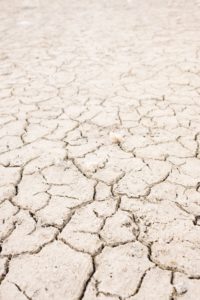There’s a new policy to fight climate change: incentives given to farmers to plant cover crops to extract carbon out of the air. Such cover crops are able to extract carbon out of the air and into the soil. Once in the soil, the carbon acts as an exceptionally good fertilizer for consumer crops to grow without the soil having to be tilled. Not having to till the soil has added benefits: It requires less energy usage from agricultural equipment, hence less pollution; and the crops that follow are more resistant to droughts, floods, and pests. In addition, they may require less water and pesticides.
The practice could be especially beneficial in places where agriculture is a major part of the economy and where climate change is wreaking havoc, like in California which is currently experiencing one of the worst recorded heat waves and droughts in history. . With more drought resistant crops, farmers could use less water, thus helping in the water shortage crisis California is regularly suffering from as a result of its large agricultural industry.
For decades, farmers in California have relentlessly pumped groundwater to irrigate their crops, draining thick, water-bearing clay layers deep underground. As the clays compress, the surface ground is affected and roads, bridges, and irrigation canals have cracked, causing extensive and expensive damage.
To illustrate the kind of problems this causes. In 2014, when NASA scientists flew radar equipment over the California Aqueduct, a critical piece of water infrastructure, they found that one section had dipped 20 centimeters in just over 4 months. Such sagging can leave canals carrying less water—an “ultimate irony,” says Graham Fogg, a hydrogeologist at the University of California (UC), Davis, because they were built in part to slacken demand for groundwater. Excessive pumping also jeopardizes water quality, as pollutants accumulate within groundwater and the clays release arsenic. Worst of all, the persistent pumping means that, one day, aquifers might run out of usable water.

Finally, one additional advantage of cover crops is that farmers will no longer need to use large quantities of chemicals to protect their crops, chemicals that affect the crops directly and are also harmful to the environment, particularly in the form of runoff into water systems.
Three types of chemicals are in use to kill agricultural pests and weeds: Insecticides, herbicides, and fungicides. They enter and contaminate water through direct application, runoff, and atmospheric deposition. They can poison fish and wildlife, contaminate food sources, and destroy the habitat that animals use for protective cover.
Cover Crops: What They Are, How to Pay for Them
So what are the types of plants that act as cover crops? They include cereals, brassicas, legumes and other broadleaf species, and can be annual or perennial plants. Cover crops can be adapted to fit almost any production system.
Popular cover crops include cereal rye, crimson clover and oilseed radish. Familiar small grain crops, like winter wheat and barley, can also be adapted for use as cover crops. However, farmers with the goal of sequestering maximum carbon in their soil would plant alfalfa or canola. That was the quick answer to the “best crops to keep carbon” question from Agriculture Canada researcher Brian McConkey. Alfalfa is a nitrogen fixer that puts lots of resources into its roots, keeps the soil dry so it reduces decomposition and does that job even in degraded soils. The end result? More carbon is kept in the soil.
The funding for cover crop usage is coming largely in the form of a public incentive. It may be a part of President Biden’s Green New Deal. President Joe Biden’s administration has also earmarked $30 billion to help pay farmers to implement sustainable practices and capture carbon in their soil.
Related Articles: Conceptual Framework and Methods for Assessing Food Systems | The Importance of Investment and Farmer Innovation
But there’s also another source of revenue for farmers engaged in carbon extraction farming: the growing market for carbon credits. Whoever acts as a “carbon sink” can claim credits that can then be sold to polluters through the afore-mentioned market. A growing number of such market mechanisms are set up around the world – at the time of writing, Europe has the largest carbon trading market and China has just launched its own scheme which is expected to become the largest in the world. McKinsey estimates that the global market for carbon credits could be worth more than $50 billion in 2030.
Farmers find that they can generate revenue from selling credits through Nori, a small carbon marketplace based in Seattle. Here, companies and individuals eager to offset their own carbon footprints can purchase carbon credits from farmers who have sequestered CO2. Lately, there’s been an explosion of private marketplaces such as Nori. For example, Indigo Ag, a start-up that advocates for regenerative farming practices, is one such newcomer and it is finding broad interest in carbon trading among corporations. Indigo Ag, said corporations like Barclays, JPMorgan Chase and Shopify have committed to purchasing agricultural carbon credits that help growers with transition costs.
The whole process is a win-win for farmers, the public, and the planet. Farmers get to increase their revenue from public and private incentives to plant cover crops and reduce their costs from the added benefits of carbon rich soil. This in turn lowers costs to the public for food and agricultural goods. And finally, our planet is made more sustainable for everyone.
Editor’s Note: The opinions expressed here by Impakter.com contributors are their own, not those of Impakter.com — In the featured image: A field of canola crop. Featured Image Credit: Michael Milverton.









